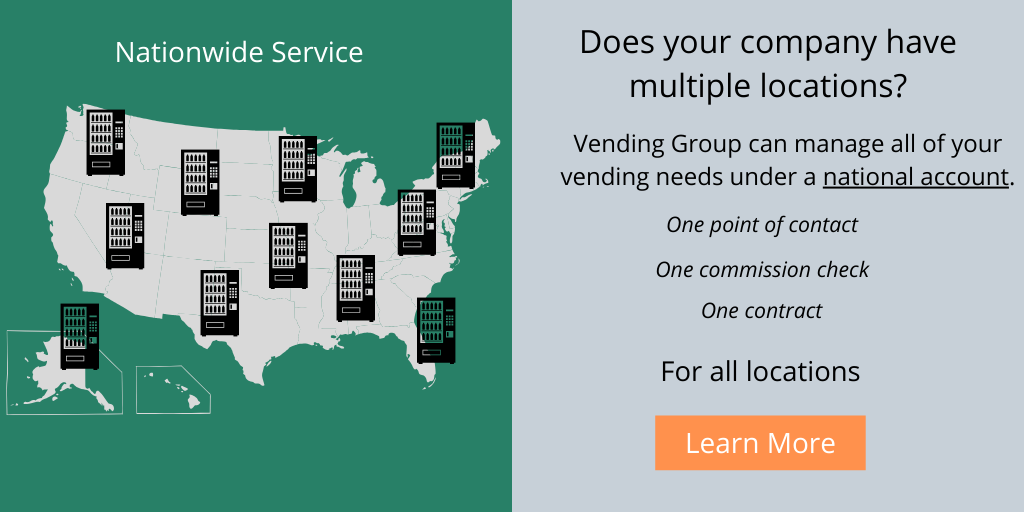Savvy property owners and managers constantly seek innovative ways to enhance their revenue streams. One unconventional yet promising avenue to explore is the incorporation of vending machines on your properties. This blog aims to dissect this decision's return on investment (ROI) aspect, particularly focusing on the service agreement model as a unique approach to vending machine ownership.
The integration of vending machines is not merely about providing snacks and beverages, like a coca cola vending machine; it represents a modern, service-oriented collaboration between property owners and national vending services. This symbiotic relationship transforms the typical ownership landscape, transcending the boundaries of conventional investments.
Instead of acquiring physical assets outright, property owners engage in service agreements, positioning vending machines as an operational service rather than a traditional capital investment. This paradigm shift not only streamlines the acquisition process but also sets the stage for a more dynamic and flexible approach to property enhancement. We’ll explain more about how it works now!
Vending Machine ROI: Is Owning a Vending Machine Profitable?
Yes, owning a vending machine can be profitable! Contrary to traditional investments, instead of owning or purchasing a vending machine outright, you can choose a service agreement model. In this model, property owners form agreements with national vending services, allowing them to place vending machines on their premises. This way they get the equipment that they need without the investment or costs to continuing service. This model simplifies the investment process into a service-driven collaboration rather than a traditional asset acquisition.
It also makes servicing your vending machine once it is on the property super easy! National vending service providers have relationships with vending service companies across the country to ensure your machines are always stocked and have exactly what your tenants, guests, or employees are looking for. When you are dealing with dozens or hundreds of machines, it can be a significant investment, but this model can help ensure you are maximizing profit. They can help you manage the inventory and adjust according to what sells the most to ensure you are getting the most from your vending machines.
Related Content: Vending Machine Servicing: Self-Fill vs. Full-Service
Benefits of the Service Agreement Model
At the surface, it seems like having a vending machine on a property involves actually purchasing a machine, purchasing the products, and manually stocking the machines as they empty. However, the model is not like that at all! Decades ago, that may have been the case. Still, today, with the popularity and convenience of state-of-the-art vending machines, markets, and general services (think school supplies or electronics), the entire industry model has shifted.
One of the primary advantages of opting for the service agreement model is the hands-off nature it offers to property owners and managers. The vending service provider typically handles machine installation, maintenance, and restocking. This relieves property managers of the operational burdens associated with vending machines, allowing them to focus on their core responsibilities. Moreover, the service agreement often includes regular revenue-sharing arrangements, providing property owners with a consistent income stream without the day-to-day management hassles.
Cost Efficiency and Risk Mitigation
So how much is a vending machine, really? Incorporating vending machines through a service agreement minimizes the upfront costs and risks traditionally associated with owning and operating these machines. The vending service provider absorbs the initial setup expenses, sparing property owners from substantial capital investments. Additionally, ongoing maintenance and repairs become the responsibility of the service provider, further reducing financial risks for property owners. This cost-efficient model enables property managers to diversify their revenue streams without exposing themselves to the financial uncertainties commonly associated with business ventures.
Realizing Profitability Sooner: Vending Machine ROI
The accelerated path to profitability is a key attraction of the service agreement model. Traditional investments may take considerable time before generating returns, but vending machines, when managed by a reputable service, can start yielding profits relatively quickly. With minimal upfront costs and a streamlined operational process, property owners can realize returns on their investment sooner than with many other types of property enhancements or income-generating ventures. This rapid turnaround contributes to the overall appeal of vending machines as a profitable addition to diverse property portfolios.
Customization and Adaptability
National vending services often provide a wide range of customizable options for property owners. This adaptability allows property managers to tailor the vending machine offerings to match the preferences and needs of their specific clientele. Whether it's selecting healthier snack options for an office building or stocking popular items in a hotel lobby, the flexibility of vending services ensures that the machines align seamlessly with the property's demographic and atmosphere. This personalized touch enhances customer satisfaction and contributes to the vending machine venture's overall success and profitability.
The service agreement model for vending machines presents an attractive proposition for property owners and managers looking to diversify their revenue streams. The hands-off approach, coupled with cost efficiency, accelerated profitability, and customization options, positions vending machines as a low-risk yet lucrative addition to various property types. By embracing this innovative model, property owners can not only enhance the amenities offered on their premises but also unlock a steady and reliable income source, making vending machines a compelling investment in the realm of property management.



